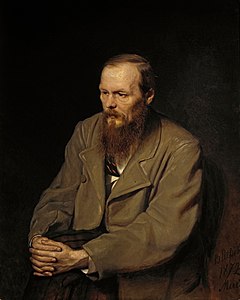What does Fyodor Dostoevsky mean?
Definitions for Fyodor Dostoevsky
fy·o·dor dos·to·evsky
This dictionary definitions page includes all the possible meanings, example usage and translations of the word Fyodor Dostoevsky.
Princeton's WordNet
Dostoyevsky, Dostoevski, Dostoevsky, Feodor Dostoyevsky, Fyodor Dostoyevsky, Feodor Dostoevski, Fyodor Dostoevski, Feodor Dostoevsky, Fyodor Dostoevsky, Feodor Mikhailovich Dostoyevsky, Fyodor Mikhailovich Dostoyevsky, Feodor Mikhailovich Dostoevski, Fyodor Mikhailovich Dostoevski, Feodor Mikhailovich Dostoevsky, Fyodor Mikhailovich Dostoevskynoun
Russian novelist who wrote of human suffering with humor and psychological insight (1821-1881)
Wikipedia
Fyodor Dostoevsky
Fyodor Mikhailovich Dostoevsky (UK: , US: ; Russian: Фёдор Михайлович Достоевский, tr. Fyódor Mikháylovich Dostoyévskiy, IPA: [ˈfʲɵdər mʲɪˈxajləvʲɪdʑ dəstɐˈjefskʲɪj] (listen); 11 November 1821 – 28 January 1881), sometimes transliterated as Dostoyevsky, was a Russian novelist, short story writer, essayist and journalist. Dostoevsky's literary works explore the human condition in the troubled political, social, and spiritual atmospheres of 19th-century Russia, and engage with a variety of philosophical and religious themes. His most acclaimed novels include Crime and Punishment (1866), The Idiot (1869), Demons (1872), and The Brothers Karamazov (1880). His 1864 novella, Notes from Underground, is considered to be one of the first works of existentialist literature. Numerous literary critics regard him as one of the greatest novelists in all of world literature, as many of his works are considered highly influential masterpieces.Born in Moscow in 1821, Dostoevsky was introduced to literature at an early age through fairy tales and legends, and through books by Russian and foreign authors. His mother died in 1837 when he was 15, and around the same time, he left school to enter the Nikolayev Military Engineering Institute. After graduating, he worked as an engineer and briefly enjoyed a lavish lifestyle, translating books to earn extra money. In the mid-1840s he wrote his first novel, Poor Folk, which gained him entry into Saint Petersburg's literary circles. However, he was arrested in 1849 for belonging to a literary group, the Petrashevsky Circle, that discussed banned books critical of Tsarist Russia. Dostoevsky was sentenced to death but the sentence was commuted at the last moment. He spent four years in a Siberian prison camp, followed by six years of compulsory military service in exile. In the following years, Dostoevsky worked as a journalist, publishing and editing several magazines of his own and later A Writer's Diary, a collection of his writings. He began to travel around western Europe and developed a gambling addiction, which led to financial hardship. For a time, he had to beg for money, but he eventually became one of the most widely read and highly regarded Russian writers. Dostoevsky's body of work consists of thirteen novels, three novellas, seventeen short stories, and numerous other works. His writings were widely read both within and beyond his native Russia and influenced an equally great number of later writers including Russians such as Aleksandr Solzhenitsyn and Anton Chekhov, philosophers Friedrich Nietzsche and Jean-Paul Sartre, and the emergence of Existentialism and Freudianism. His books have been translated into more than 170 languages, and served as the inspiration for many films.
ChatGPT
fyodor dostoevsky
Fyodor Dostoevsky (1821–1881) was an influential Russian novelist, short story writer, and essayist, known for his profound psychological insight into the human mind and his exploration of themes such as morality, religion, and social and political structures. He is best known for his works "Crime and Punishment", "The Idiot", "Demons", and "The Brothers Karamazov". His literary contributions have been highly influential in the development of modern literature and psychology.
Suggested Resources
fyodor dostoevsky
Quotes by fyodor dostoevsky -- Explore a large variety of famous quotes made by fyodor dostoevsky on the Quotes.net website.
Matched Categories
Numerology
Chaldean Numerology
The numerical value of Fyodor Dostoevsky in Chaldean Numerology is: 8
Pythagorean Numerology
The numerical value of Fyodor Dostoevsky in Pythagorean Numerology is: 4
Translation
Find a translation for the Fyodor Dostoevsky definition in other languages:
Select another language:
- - Select -
- 简体中文 (Chinese - Simplified)
- 繁體中文 (Chinese - Traditional)
- Español (Spanish)
- Esperanto (Esperanto)
- 日本語 (Japanese)
- Português (Portuguese)
- Deutsch (German)
- العربية (Arabic)
- Français (French)
- Русский (Russian)
- ಕನ್ನಡ (Kannada)
- 한국어 (Korean)
- עברית (Hebrew)
- Gaeilge (Irish)
- Українська (Ukrainian)
- اردو (Urdu)
- Magyar (Hungarian)
- मानक हिन्दी (Hindi)
- Indonesia (Indonesian)
- Italiano (Italian)
- தமிழ் (Tamil)
- Türkçe (Turkish)
- తెలుగు (Telugu)
- ภาษาไทย (Thai)
- Tiếng Việt (Vietnamese)
- Čeština (Czech)
- Polski (Polish)
- Bahasa Indonesia (Indonesian)
- Românește (Romanian)
- Nederlands (Dutch)
- Ελληνικά (Greek)
- Latinum (Latin)
- Svenska (Swedish)
- Dansk (Danish)
- Suomi (Finnish)
- فارسی (Persian)
- ייִדיש (Yiddish)
- հայերեն (Armenian)
- Norsk (Norwegian)
- English (English)
Word of the Day
Would you like us to send you a FREE new word definition delivered to your inbox daily?
Citation
Use the citation below to add this definition to your bibliography:
Style:MLAChicagoAPA
"Fyodor Dostoevsky." Definitions.net. STANDS4 LLC, 2024. Web. 31 Oct. 2024. <https://www.definitions.net/definition/Fyodor+Dostoevsky>.



Discuss these Fyodor Dostoevsky definitions with the community:
Report Comment
We're doing our best to make sure our content is useful, accurate and safe.
If by any chance you spot an inappropriate comment while navigating through our website please use this form to let us know, and we'll take care of it shortly.
Attachment
You need to be logged in to favorite.
Log In